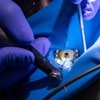Dental students may find endodontics stressful, and factors like clinical procedures and teaching methods affect their confidence levels, according to a review recently published in the International Endodontic Journal.
Therefore, refining endodontic education may reduce stress and improve learning, the authors wrote.
“The origin of student stress and confidence in undergraduate student endodontics is multifactorial,” wrote the authors, led by K. J. Fouillen of the University of Bretagne Occidentale Brest University Hospital in France (Int Endo J, August 8, 2025).
To examine factors affecting stress and confidence in endodontic education and identify ways to reduce stress and support student well-being, 51 quantitative, qualitative, and mixed-method studies were evaluated.
Managing endodontic patient expectations, personalities, and pain were major sources of stress for students, with studies showing a link between anxiety about root canal treatment and challenges in managing patients. Also, students experienced heightened anxiety when dealing with pain control during emergency cases, they wrote.
The complexity of endodontic procedures, including multiple steps, visualization issues, and potential complications, added to these difficulties.
Supportive, experienced academic staff along with hands-on training, reflective learning, and systematic feedback were found to be essential for reducing stress and building student confidence. Additionally, factors such as clinical organization, equipment availability, time for practice, and individual student characteristics influenced stress levels.
However, the study had limitations. Varied methods and outcome measures in addition to differing levels of evidence made it difficult to compare results across studies, the authors added.
“Some educational improvements can contribute to moderating the stress and increasing confidence, as well as enhancing endodontic learning,” Fouillen and colleagues concluded.




















